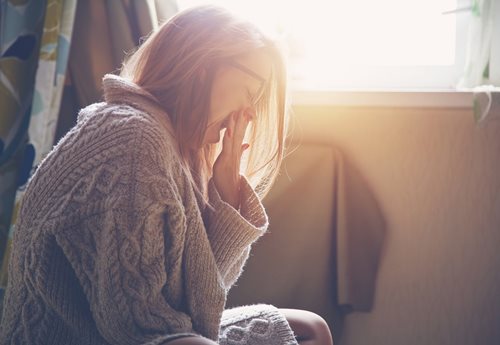January 11, 2017
By Danei Edelen and Alex Hanna

My psychiatrist once said to me, "The most important issue for anyone with a mental health condition is sleep." At the time, I agreed with him, but I didn't fully understand his comment. Like many with a mental health condition, I have struggled with sleep—getting out of bed every morning is always a challenge—but I didn’t understand why.
Getting up each day is just something people do. Even if reluctantly, most people can muster the strength to slip out from under the sheets, put their feet on the floor and stand up. For some of us, getting out of bed is not so simple. For some of us, it’s our toughest battle of the day. Now there might be plenty of people out there who think we just aren't trying hard enough, or that we don't feel the same sense of responsibility for daily chores. But that just isn’t the case.
The Science Behind the Battle
A study published in the April 2016 Biological Psychiatry journal may have an explanation. “For more than 50 years, there’s been evidence that there’s something wrong with circadian rhythms in people with bipolar disorder…” reports Harry Pantazopoulos, lead author of the study. A circadian rhythm is the 24-hour cycle your body undergoes. In general, it tells you to feel tired and when to feel awake. It can be impacted by several external factors: how long you've been awake, the amount of light outside, whether you’ve just landed in a new time zone or even by something like temperature.
“Results of the study link abnormalities in circadian rhythms to changes to…a neuron responsible for a healthy circadian rhythm. [This]… correlates very strongly with the established severity of depression and anxiety symptoms in people with mood disorders.” The study also notes that this abnormality frequently occurs in the morning.
So, what does this mean? It means that people with certain mood disorders don't—likely can't—follow what would be deemed a "normal" sleep pattern. And the science isn’t restricted to people with mood disorders. Other mental health conditions, such as depression, are found to have a similar correlation, as is discussed in an article published by Live Science.
But What Can I Do?
- Consult your mental health care provider or primary care doctor. I personally benefit from prescription medication (as directed by my mental health physician). While it took me years to find the right medications, I can say that the difference is night and day (get it!?). Others may benefit from the supplement melatonin, which can be bought over-the-counter at any drugstore.
- Exercise. It has been incredibly helpful for me to regularly exercise, even when it’s just walking around the block. Exercising daily has been key for my body to develop a routine. Especially in the mornings—when every ounce of my being fights back—my habit of waking up and exercising has saved me from otherwise dark days in bed.
- No electronics before bedtime. We have a rule in our house: No electronics after 9pm. The artificial light produced by computers, smart phones, tablets, TVs, and the like trick your body into thinking it’s a different time of day. By removing that artificial light, your body can naturally produce melatonin as the sun goes down, which helps you become sleepy.
- Set your alarm clock. Going to bed and getting up at the same time every day—even on weekends—helps me maintain a healthy sleep routine. After starting this routine, it has been easier for me to get to sleep at night, sleep soundly through the night and wake up in the morning.
There are several other healthy habits that can provide relief for those of us with abnormal circadian rhythms. There are absolutely factors outside of our control, but we are not powerless in making changes that can impact our circadian rhythms.
My daily struggle to get out of bed is still what I consider to be my toughest battle. It doesn't make sleeping any easier, but it does bring a level of comfort to know that there are scientific answers for why so many of us experience the same struggle. And it makes me feel even better that there are little things I can do every day to make the battle easier—even if it’s just slightly so.
Danei Edelen is married and lives with her husband and son in Cincinnati, Ohio. Danei owns Instant Marketing LLC. Danei has a bachelor's degree and over 20 years in marketing. She is also a NAMI presenter for the Southwestern Ohio chapter speaking to groups of all ages to help end the stigma. She blogs for the Challenge the Storm, and the Mighty. Danei enjoys, reading, writing, exercise and learning about nutrition.
Submit To The NAMI Blog
We’re always accepting submissions to the NAMI Blog! We feature the latest research, stories of recovery, ways to end stigma and strategies for living well with mental illness. Most importantly: We feature your voices.
LEARN MORE